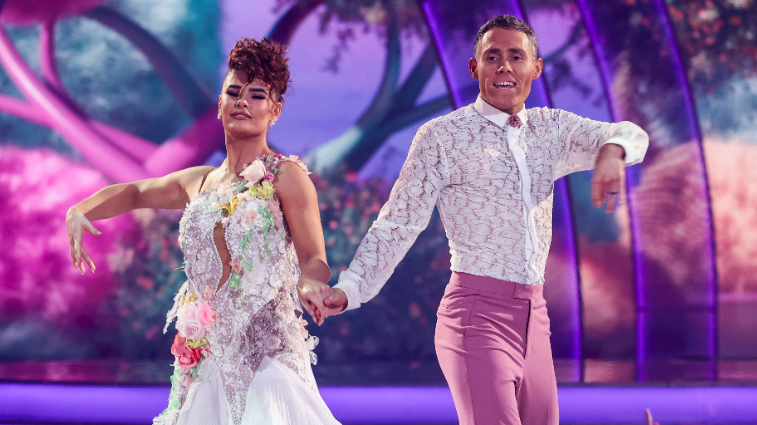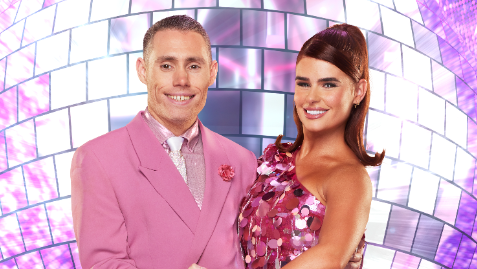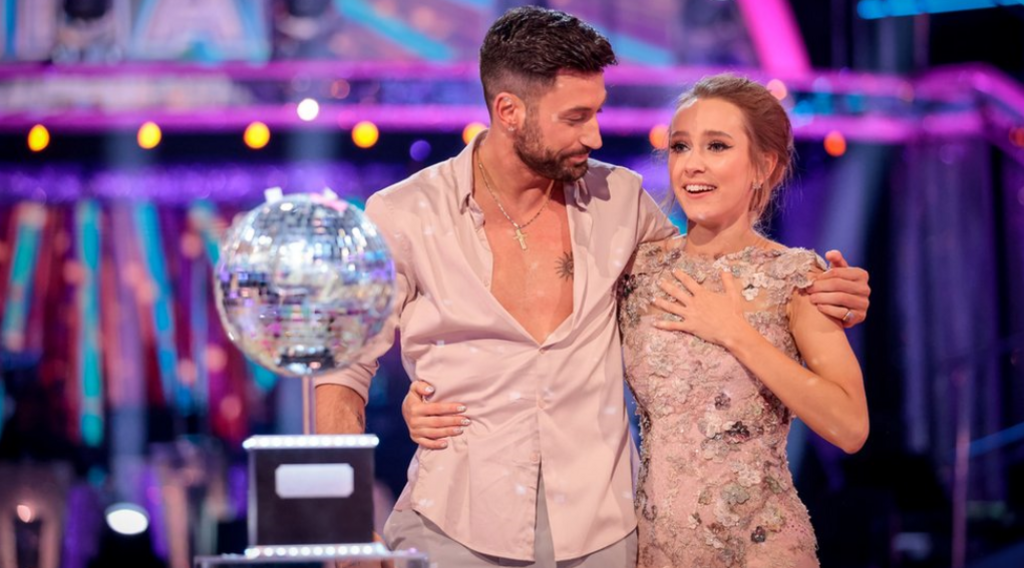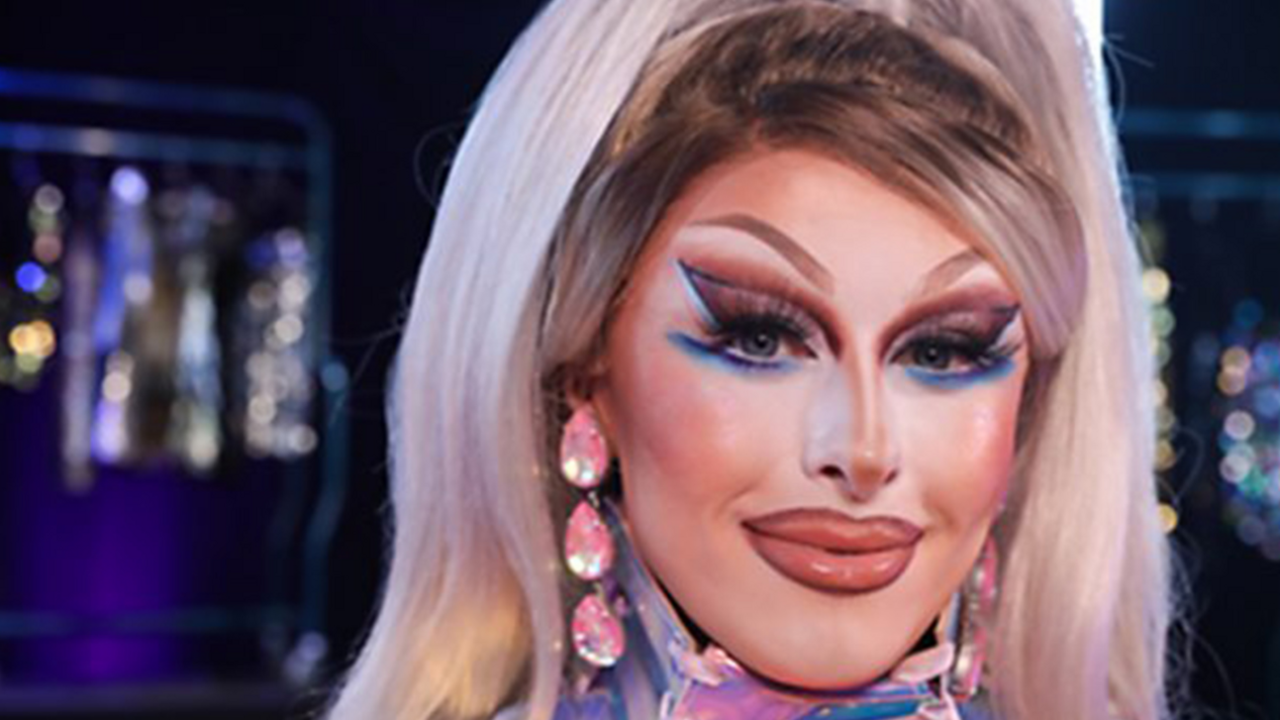Paralympian hopes for dance show legacy on RTÉ

Jason Smyth is through to the semi-finals of Dancing With The Stars on Sunday
- Published
Paralympic champion Jason Smyth has said performing on RTÉ's Dancing With The Stars is an important platform for disability representation.
Jason, who is visually impaired, is in the competition's semi-finals on Sunday with his dance partner Karen Byrne.
He said that hopes are high the pair can go all the way to the grand final.
Earlier this month, Jason and Karen received an award for their work in changing public perceptions around people with disabilities through dance.
They went to a ceremony at Leinster House and met Taoiseach (Irish prime minister) Leo Varadkar.

Jason Smyth was Paralympic sport's fastest man until 2021
The man from Eglinton, County Londonderry, had perfect vision up until the age of nine before a hereditary condition known as Stargardt disease began to cause his sight to deteriorate.
He stayed unbeaten during a Paralympic career, which began at the 2005 European Championships, and was Paralympic sport's fastest man until 2021.
The sprinter earned six Paralympic titles, which included 100m and 200m doubles at the Beijing and London Games in 2008 and 2012.
He announced his retirement last year at the age of 35.
Jason said that he knew when he joined Dancing With The Stars, he wanted to go beyond the glitter and show that while a visual impairment in dance may be a challenge, it is not a barrier.
Disability representation
"Disability representation on television is hugely important," he told BBC Radio Foyle's North West Today programme.
"People can associate visual impairment with words like disability, but for me, its about showing what your ability is.
"That message has resonated with viewers and I think it helps with attitudes and understanding.
"For me, it's about showing it doesn't matter what I can't see, its about your attitude and embracing what you can do."
In 2021, the BBC's Strictly Come Dancing had its first deaf contestant Rose Ayling-Ellis.
She and her dance partner Giovanni Pernice paid tribute to the deaf community with a dance where the music switched to muffled noise and silence to illustrate what Rose hears while she performs.

Ayling-Ellis and her pro partner Giovanni Pernice won BBC's Strictly Come Dancing
Jason and his dance partner performed a contemporary dance during week three of Dancing with the Stars.
During the routine the camera-work was modified briefly - representing his visual impairment on live television.
"The central part of my eye is blind, and the outside vision is very blurry," he said.
"For 15 seconds within the dance, the camera replicated this, basically it went to my vision to give people a rough sense of what I see during a performance.
"Letting them come into my world and see through my eyes."
Choreography challenges
Jason and Karen have worked together to find the best way for him to learn the choreography.
"I have to learn through how a movement feels, rather than how a movement looks," he said.
"Anyone involved in dancing - they are constantly looking in mirrors to shift their technique depending on what they see.
"It’s a process that takes longer, but Karen and I have very open conversations and good trust."
Jason said it was something they "have done well in our partnership".
"I loved the contemporary but my favourite has been the samba from week seven," he said.
"For me, in that moment, it took me up to then to let go a bit and have fun and relax into the dance more.
"It’s so different from sport, I'm having a bit more fun, embracing the acting a little more and the samba was a turning point for me."

Also featuring in the semi-final on Sunday will be Belfast drag artist Blu Hydrangea
Jason is not the only contestant from Northern Ireland in 2024's Dancing with the Stars.
Also dancing is Belfast-based Joshua Cargill, who performs as drag queen Blu Hydrangea.
Joshua told the Independent newspaper, external: "“I’m used to being in places that serve the LGBTQ+ community, like Drag Race or queer bars – that’s where I would be safe, in this queer bubble.
"But since being on the show, the people who’ve stopped me and said ‘you’re doing great’, are people who are of an older generation, who I didn’t think that I had in my audience before.
“It’s lovely, because that means that what I’m doing is working – me being on TV every week, visibly queer, is not offending these people or making them feel like I’m a menace to society."
Both contestants are of course aiming for the final.
But Jason said if his time on the show makes a difference to others, that would be a victory in itself.
"It’s very easy to go on a show like this, but you have to ask yourself why," he said.
"Is there a great purpose and a greater message you can get across.
"It’s like in sport, your journey ends at some point, but what's the legacy you can leave?
"With dancing, if just one person changes how they look at life through seeing me there taking part, than that to me is true success."